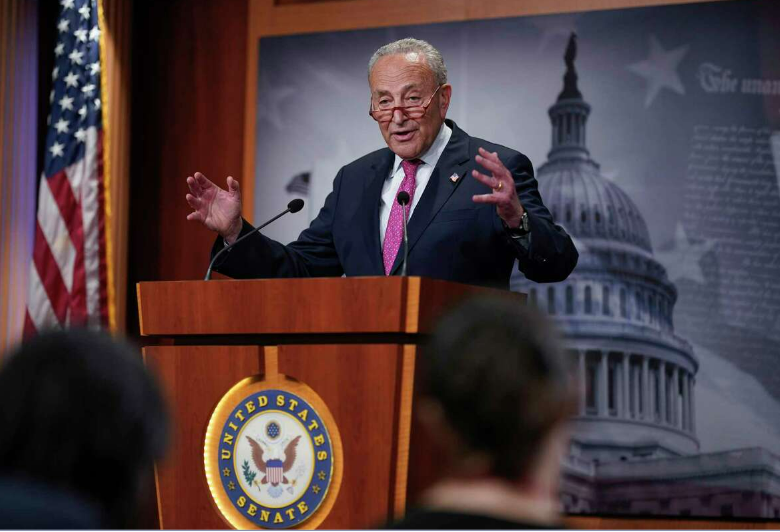On the evening of June 1, local time, the US Senate passed a bill suspending the $31.4 trillion debt ceiling to prevent the risk of government default. The bill's passage by both houses of Congress is good news for the American people and economy .
According to Reuters, with 63 votes in favor and 36 against, the bill to suspend the public debt ceiling passed the Senate in the context of lawmakers racing against time to prevent the US Government from falling into bankruptcy after months of debate between the Democratic Party and the Republican Party. The bill was hastily approved by the Senate just one day after the House of Representatives made a similar move.
“Time is a luxury the Senate does not have. Any last-minute delay or postponement would be risky and even dangerous. America can now breathe a sigh of relief,” Senate Democratic leader Chuck Schumer said in a speech on the Senate floor.
 |
US Senate Democratic leader Chuck Schumer at a press conference after passing the bill. Photo: AP |
Welcoming the Senate vote, President Joe Biden called it a “big win” for Americans. According to AFP, in a post on Twitter, Mr. Biden affirmed: “This bipartisan agreement is a big win for our economy and the American people.” With the approval of both houses of Congress, the bill will be sent to Mr. Biden’s desk to be signed into law before the deadline of June 5, when the government will run out of money to pay its bills, as warned by the US Treasury .
President Biden, Treasury Secretary Janet Yellen and other US officials have warned of dire consequences if the government defaults, including a US economic recession, a weakening of the country's global economic leadership and other global uncertainties. According to AFP, a report released by Mr. Biden's Council of Economic Advisers said that if the US defaults, more than 8 million people could lose their jobs and the country's gross domestic product (GDP) would fall by 6% compared to the present. The domestic stock market would lose up to 45% of its value in the third quarter of 2023.
Mr. Schumer and Senate Republican leader Mitch McConnell have made good on a pledge to do everything possible to speed up approval of the bill that leader Biden and House Speaker Kevin McCarthy agreed on.
In an effort to avoid the US government defaulting on its debt, on May 27, President Biden and House Speaker McCarthy reached an agreement after weeks of negotiations on the debt ceiling. The two sides agreed to suspend the $31.4 trillion debt ceiling for two years until January 1, 2025, and limit budget spending in fiscal years 2024 and 2025.
According to Bloomberg, the bill imposes an $886 billion cap on national security spending and a $704 billion cap on non-security spending in fiscal year 2024. These two figures will be raised to $895 billion and $711 billion, respectively, in fiscal year 2025. In addition, the two sides also agreed to recover unused Covid-19 fund budgets, speed up the licensing process for some energy projects and increase conditions for programs for the poor.
The Congressional Budget Office estimates the bill will save $1.5 trillion over 10 years. Once signed into law, it will suspend the US debt ceiling until January 2025, allowing Biden and Congress to put aside the deeply divisive political issue until after the 2024 presidential election.
LAM ANH
Source















































































































Comment (0)